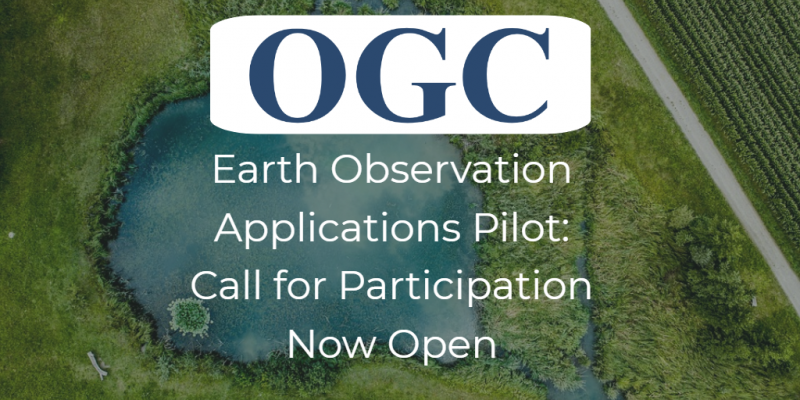Subscribe to our Press Release
Subscribe here to receive future Press Releases by email: Subscribe
techdesk [at] opengeospatial.org
The Earth Observations Applications Pilot will evaluate the maturity of specifications developed to achieve a paradigm shift in Earth Observation – from “bringing the data to the user” to “bringing the user to the data”
The Open Geospatial Consortium (OGC) has announced its Earth Observation Applications Pilot and is offering funding for interested participants. Applications close December 11th, 2019.
The “EO Exploitation Platforms” initiative of the European Space Agency (ESA) aims to achieve a paradigm shift from “bring the data to the user” (i.e. users download data locally) to “bring the user to the data” (i.e. move user exploitation to hosted environments with co-located computing and storage).
The goal of the Earth Observation Applications Pilot is to evaluate the maturity of the Earth Observation Applications-to-the-Data specifications that have been developed over the last two years as part of various OGC Innovation Program (IP) initiatives taking place in ‘real world’ environments. ‘Real world’ includes integration of the architecture in an environment requiring authenticated user identity, access controls, and billing for resources consumed.
The pilot, sponsored by ESA, consists of two phases: Phase 1 invites application developers that work with Earth Observation (EO) satellite data to join a requirements definition workshop. The objective of this workshop is to understand the exact requirements of application developers in terms of data discovery, data loading, data processing, and result delivery. The results from this requirements gathering will define the implementation evaluation and performance criteria.
Phase 2 invites EO platform operators to implement the OGC Earth Observation Applications Pilot architecture as it has been defined in previous IP initiatives. The implementation shall take Phase 1 results into account. In essence, this requires implementing two Web API endpoints to allow the registration, deployment, and execution of new processes on the platform. Meanwhile, application developers implement their cases (defined in Phase 1) to provide test cases for the architecture.
The Earth Observation Applications Pilot is being conducted under OGC’s Innovation Program, the research and development (R&D) laboratory of OGC. Under OGC’s Innovation Program, sponsors and OGC members come together to address geospatial IT challenges in an agile and cooperative manner. Since 1999, more than 120 successful initiatives have taken place, from in-kind interoperability experiments run by working group members, to hackathons, pilots, and multi-million-dollar testbeds with hundreds of participants.
Cost-sharing funds are available from the Sponsor to partially offset the costs associated with development, engineering, and demonstration activities that are part of this pilot. The cost-sharing offers selected participants a unique opportunity to recoup a portion of their initiative expenses.
More information on the Pilot, including the official Call for Participation, is available on the Earth Observation Applications Pilot Webpage. Responses are due by December 11th, 2019, at 18:00 US Eastern.
Participation is open, globally, to OGC Members and non-members alike. However, cost-sharing funds can only be requested by entities from ESA member states, Canada, and Slovenia.
About OGC
The Open Geospatial Consortium (OGC) is an international consortium of more than 530 businesses, government agencies, research organizations, and universities driven to make geospatial (location) information and services FAIR – Findable, Accessible, Interoperable, and Reusable.
OGC’s member-driven consensus process creates royalty free, publicly available geospatial standards. Existing at the cutting edge, OGC actively analyzes and anticipates emerging tech trends, and runs an agile, collaborative Research and Development (R&D) lab that builds and tests innovative prototype solutions to members’ use cases.
OGC members together form a global forum of experts and communities that use location to connect people with technology and improve decision-making at all levels. OGC is committed to creating a sustainable future for us, our children, and future generations.
Visit ogc.org for more info on our work.
NOTE: an earlier version of the synopsis section of the PR (the part in italics at the beginning) stated erroneously: “…from “bringing the data to the user” to “bringing the user to the data”” Apologies: this has now been corrected.






